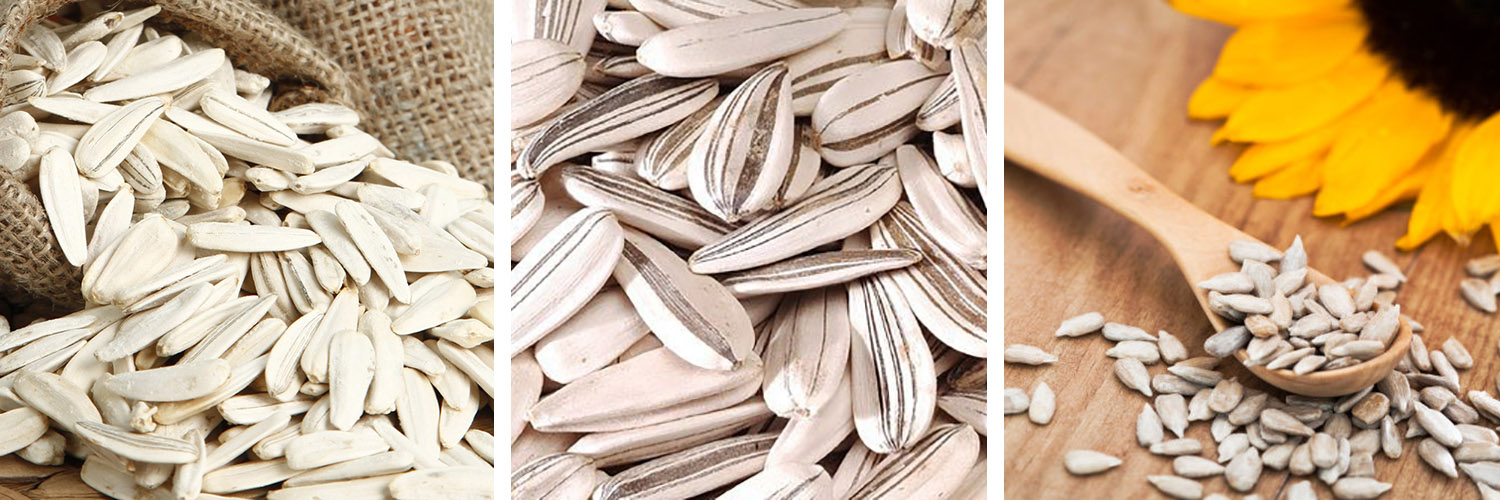Sunflower Kernel
The sunflower seed is the fruit of the sunflower (Helianthus annuus). The term "sunflower seed" is actually a misnomer when applied to the seed in its pericarp (hull). Botanically speaking, it is a cypsela. When dehulled, the edible remainder is called the sunflower kernel or heart.
There are three types of commonly used sunflower seeds: linoleic (most common), high oleic. Each variety has its own unique levels of monounsaturated, saturated, and polyunsaturated fats. The information in this article refers mainly to the linoleic variety.

For commercial purposes, sunflower seeds are usually classified by the pattern on their husks. If the husk is solid black, the seeds are called black oil sunflower seeds. The crops may be referred to as oilseed sunflower crops. These seeds are usually pressed to extract their oil. Striped sunflower seeds are primarily used for food; as a result, they may be called confectionery sunflower seeds.
Health Benefits:
Delicious, nutty, and crunchy sunflower seeds are widely considered as healthful foods. They are high in energy; 100 g seeds hold about 584 calories. Nonetheless, they are one of the incredible sources of health benefiting nutrients, minerals, antioxidants and vitamins.
Much of their calories come from fatty acids. The seeds are especially rich in poly-unsaturated fatty acid linoleic acid, which constitute more 50% fatty acids in them. They are also good in mono-unsaturated oleic acid that helps lower LDL or "bad cholesterol" and increases HDL or "good-cholesterol" in the blood. Research studies suggest that Mediterranean diet which is rich in monounsaturated fats help to prevent coronary artery disease, and stroke by favoring healthy blood lipid profile.
Like in other nuts, they too are a very good source of proteins loaded with fine quality amino acids such as tryptophan that are essential for growth, especially in children. Just 100 g of seeds provide about 21 g of protein (37% of daily-recommended values).
In addition, sunflower seeds contain health benefiting poly-phenol compounds such as chlorogenic acid, quinic acid, andcaffeic acids. These compounds are natural anti-oxidants, which help remove harmful oxidant molecules from the body. Further, chlorogenic acid helps reduce blood sugar levels by limiting glycogen breakdown in the liver.
Further, the seeds are indeed a very rich source of vitamin E; contain about 35.17 g per 100 g (about 234% of RDA). Vitamin E is a powerful lipid soluble antioxidant, required for maintaining the integrity of cell membrane of mucus membranes and skin by protecting it from harmful oxygen-free radicals.
Sunflower kernels are one of the finest sources of B-complex group of vitamins. They are very good sources of B-complex vitamins such as niacin, folic acid, thiamin (vitamin B1), pyridoxine (vitamin B6), pantothenic acid, and riboflavin.
Sunflowers are incredible sources of folic acid. 100 g of kernels contains 227 µg of folic acid,which is about 37% of recommended daily intake. Folic acid is essential for DNA synthesis. When given in anticipant mothers during the peri-conceptional period, it may prevent neural tube defects in the baby.
Niacin and pyridoxine are other B-complex vitamins found abundantly in the sunflower seeds. About 8.35 mg or 52% of daily-required levels of niacin is provided by just 100 g of seeds. Niacin helps reduce LDL-cholesterol levels in the blood. In addition, it enhances GABA activity inside the brain, which in turn helps reduce anxiety and neurosis.
The seeds are incredibly rich sources of many essential minerals. Calcium, iron, manganese, zinc, magnesium, selenium, and copper are especially concentrated in sunflower seeds. Many of these minerals play a vital role in bone mineralization, red blood cell production, enzyme secretion, hormone production, as well as in the regulation of cardiac and skeletal muscle activities.
Just a handful of sunflower kernels a day provides much of the recommended level of phenolic anti-oxidants, minerals, vitamins, and protein.
